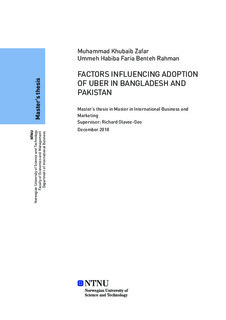| dc.contributor.advisor | Glavee-Geo, Richard | |
| dc.contributor.author | Rahman, Ummeh Habiba Faria Benteh | |
| dc.contributor.author | Zafar, Muhammad Khubaib | |
| dc.date.accessioned | 2019-05-24T14:00:33Z | |
| dc.date.available | 2019-05-24T14:00:33Z | |
| dc.date.issued | 2018 | |
| dc.identifier.uri | http://hdl.handle.net/11250/2598707 | |
| dc.description.abstract | Formål: Over all hensikt med denne studien er å undersøke konsernets oppførselstiltak
mot vedtak av uber med fokus på effekter av digitalisering og delt økonomi ved adopsjon
av uber. Et annet mål er å undersøke de kulturelle faktorene i Bangladesh og Pakistan som
leder mennesker mot vedtak av ikke-tradisjonelle transportkilder.
Design / Metodikk / Tilnærming: Teorien om planlagt oppførsel integrert med Hofstede
Kulturelle dimensjoner har blitt brukt til å undersøke Behavioral Intention of customers towards
vedtak av uber. Videre, effekten av teknologien vedtaksmodell og to andre faktorer, risiko
og tillit, på atferdsmessig intensjon om bruk av uber har blitt undersøkt. Data ble samlet inn
gjennom spørreskjemaer fra 145 respondenter fra Bangladesh og Pakistan.
Resultater: Empiriske funn viser at risiko negativt påvirker adferdsintensjonen. Furthere,
Holdning mot oppførsel er svært positivt signifikant når den er moderert av maskulinitet
og usikkerhetsfjerning modererer forholdet mellom sosiale normer og
Behavioral Intention, mens Usikkerhetsforebygging modererer forholdet mellom Oppfattet
Behavioral Control og Behavioral Intention negativt. Videre viser studien også at kvinner
er mer interessert i å bruke Uber service.
Begrensninger av studiet: Data samles inn via elektroniske lukkede spørreskjemaer som begrenser
generaliseringen av studien.
Ledelsesimplikasjoner: Studie identifiserer kvinnen som et større marked og gir en
mulighet til Uber å kategorisere risikoen som er utbredt i samfunnet og definere nye strategier av
tilpasse seg den lokale kulturen ved å være et globalt selskap.
Nøkkelord: Theory of Planned Behavior, Technology Adoption Model, Hofstede's Cultural
Dimensjoner, risiko, tillit, digitalisering, delt økonomi. | |
| dc.description.abstract | Purpose: Over all purpose of this study is to investigate the behavioral intentions of consumers
towards adoption of Uber with focus on effects of digitalization and shared economy on adoption
of Uber. Another objective is to examine the cultural factors of Bangladesh and Pakistan which
are leading people towards adopotion of non traditional source of transport.
Design/Methodology/Approach: Theory of Planned Behavior integrated with Hofstede’s
Cultural Dimensions has been used to examine the Behavioral Intention of customrs towarcs
adoption of Uber. Further, the effects of Technolgy Adoption Model and two other factors Risk
and Trust on Behavioral Intention of using Uber have been investigated. Data was collected
through questionnaires from 145 respondents from Bangladesh and Pakistan.
Findings: Empirical findings show that Risk negatively affects the Behavioral Intention. Furthere
Attitude Towards Behavior is highly positively significant when it is moderated by Masculinity
and Uncertainty Avoidance positively moderates the relation between Social Norms and
Behavioral Intention, while Uncertainty Avoidance moderates the relation between Perceived
Behavioral Control and Behavioral Intention negatively. Moreover, study also showed that women
are more interested in using Uber service.
Limitations of Study: Data is collected through online close-ended questionnaires which limits
the generalization of the study.
Managerial Implications: Study identifies the female as a bigger market and provides an
opportunity to Uber to categorize the risks prevalant in the society and define new strategies by
adapting to the local culture by being a global company.
Keywords: Theory of Planned Behavior, Technology Adoption Model, Hofstede’s Cultural
Dimensions, Risk, Trust, Digitalization, Shared Economy. | |
| dc.language | eng | |
| dc.publisher | NTNU | |
| dc.title | Factors Influencing Adoption of Uber in Bangladesh and Pakistan | |
| dc.type | Master thesis | |
